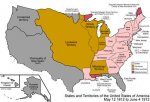- Joined
- Jul 13, 2009
- Messages
- 17,661
- Reaction score
- 12,265
- Location
- State of Jefferson
- Gender
- Male
- Political Leaning
- Moderate
Yeah. I think that it was historian Howard Zinn who argued that the war of 1812 forever changed how the US treated native Americans. For the worse. Not that they were well treated before but after that Indian lands were simply lands to take
Really, you are pulling out Howard Zinn? The same guy that thought the invasion of Kuwait by Iraq was justified, and that the US had no business getting involved in an internal affair?
And the relations of the US Government and the Indians was actually pretty good, prior to the War of 1812, when the British convinced many tribes to go to war against the US. And not all tribes did that, and not all suffered in the aftermath. And even after the war was over, not all tribes were treated the same.
In most senses, they were given the status of an independent entity, with their own territorial boundries. Most groups had no problem with that, some took offense at it and went to war to extend or eliminate those borders. But it was not universal, as to be expected the more warlike tribes fought against it more then the more peaceful tribes. And most of the troubles in US-Indian relations I place squarely on the shoulders of one man, Andrew Jackson. More then any other he ultimately is the one responsible for turning formerly friendly tribes hostile against the US.

